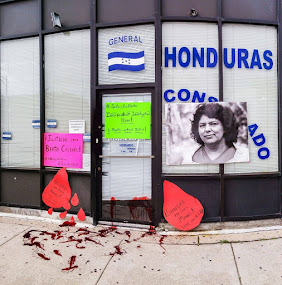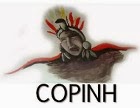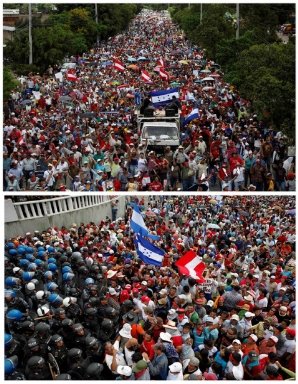Un comunicado en español sigue el articulo en ingles
APRIL 17 - International Day of Campesino Struggle
by Victoria Cervantes, La Voz de los de Abajo - Chicago
Honduran Campesinos mobilize for land and survival. - Land
takeovers in 5 provinces.
 |
| January 26, 2012, Tutule, La Paz ---defensoresenlinea.com |
After the massacre of campesinos of the MST in Brazil on April 17, 1996 the date was declared the International Day of Campesino Action by Via Campesina and other campesino organizations. Today, April 17, 2012, amidst constant attacks and violence from the big landowners
and oligarchy that control the police,military and government, Honduran campesinos are
mobilizing in defense of their rights to land and survival. At least 13 campesino groups
today recuperated land in 5 different provinces in Honduras. The action is organized by
the National Center for Rural Workers (CNTC) a sector of the National Association of
Honduran Campesinos (ANACH) and others on lands that according to agrarian law
should be owned by the campesinos. The land recuperations are occurring now In
Olancho, Francisco Morazan, Paraiso, Yoro, and Cortes.
Honduran campesinos have always faced violence and repression, but since the June
28, 2009 military coup the situation has deteriorated dramatically with increasing
impunity, militarization and power of the land owning oligarachy and corporate
agribusiness. To make matters worse, the Honduran National Congress in December
2010 annulled former President Zelaya’s order (Decree 18-2008) for a limited land
reform that would have given dozens of campesino communities title to disputed lands.
Campesino organizations denounce an increase in terror tactics and violence in which
national police and other military or mysterious men, dressed in black with their faces
covered but carrying police and military weapons, arrive in communities before dawn,
knock down doors, pull men women and children violently out of their homes and then
destroy the homes and detain community members. Bulldozers and fire have been used
to destroy homes and crops. The local leaders in the communities are held in jail or
placed on probation requiring them to travel distances every week to sign in at a police
station. Always the threat of another traumatizing and violent attacks hangs over the
community. These attacks on campesino communities have occurred in the Tutule region of La Paz (20 evictions as many as 3 in one week), in Olancho, Atlantida and other regions.
The violence and attacks on organized campesinos is infamous in the lower Aguan
region in Colon where more than 50 assassinations have taken place since January
2010, and there are constant threats, violence detentions and harassment. Just during
the past 4 weeks 2 members of the Unified Campesino Movement of Aguan (MUCA)
were murdered and two others detained. The Campesino Movement of Rigores were
harassed by armed troops after the community verbally confronted the government’s
Agrarian Institute director Cesar Ham and on March 18th a land recuperation in Las
Brisas, Colon was violently evicted.
Government and agro-business terror against the campesinos is paired with bad-faith
negotiations or promises of negotiations to supposedly resolve land disputes. On
February 23 of this year, Cesar Ham convened a meeting of campesino groups, many
of whom have been recently evicted or are in imminent danger of eviction. According to
some participants the meeting was “a lot of talk about possible negotiations but nothing
concrete”. So far, when negotiations have resulted in settlements either the land-owners
have openly refused to full-fill the agreements (the case of African Palm grower
magnate, Miguel Facusse and MUCA communities) or the negotiations have resulted in
untenable, smaller amounts of land and large debt burdens for the campesinos , for
example, a February 17th agreement with some MUCA communities.
No wonder then that campesino organizations have decided to step up their struggle for
land and to be allowed to produce food and other crops that can sustain their families
and the rural economies. Honduras is one of the poorest countries in the region; the
United Nations World Food Programme estimates that chronic malnutrition in the
countryside is as high as 48.5% and the average rate is 34%. In a recent interview with
Jesus Ponce, Secretary General of the CNTC, the campesino leader denounced the
violence and attacks on the campesinos and stated, “we only want land to plant and to
be productive; the campesinos will never leave land abandoned when so many are
hungry; we can be part of a solution to the problems but instead the government, the big
landowners, consider us to be less than animals and an obstacle to their plans. The
land belongs to us and we demand Justice, Land, and Liberty! ”.
Support the campesinos - Dennounce the violence against campesino
communities.
Send an email in Spanish or in English in support of the campesino movement demands for an end to attacks and violence against their communities and organizations and for a recognition of their rights to the land.
Send an email in Spanish or in English in support of the campesino movement demands for an end to attacks and violence against their communities and organizations and for a recognition of their rights to the land.
Cesar Ham, Director of the National Agrarian Institute: cham@ina.hn
Porfirio Lobo, President of the Republic of Honduras: diseloalpresidente@presidencia.gob.hn
with a copy to La Voz de los de Abajo: lavozchicago@yahoo.com
Comunicado de Prensa -Abril 17, 2012
La Voz de los de Abajo, Chicago, Illinois, USA
Campesinos se movilizan para la tierra y la supervivencia. - La toma de tierras en 5 provincias.
Después de la masacre de 19 campesinos el 17 de abril de 1996 en Brasil, en la movilización por la reforma agraria. Campesinos Brasileños y Vía Campesina declaran el 17 de Abril Como día Internacional del Campesino.
Hoy, 17 de abril de 2012, en medio de constantes ataques y la violencia de los grandes terratenientes y la oligarquía que controla la policía, el ejército y el gobierno, los campesinos hondureños se movilizan en defensa de sus derechos a la tierra y la supervivencia. Hoy más de 13 grupos campesinos hoy están recuperado la tierra en 5 departamentos de Honduras. (Olancho, Francisco Morazán, El Paraíso, Yoro y Cortés). La acción está organizada por La Central Nacional de Trabajadores del Campo (CNTC) y un sector de la Asociación Nacional de Campesinos de Honduras (ANACH)
Los Campesinos hondureños siempre han enfrentado la violencia y la represión, pero desde el golpe de estado militar del 28 de junio 2009 la situación se ha deteriorado dramáticamente con la creciente impunidad, la militarización y el poder agroindustrial de la oligarquía y los terratenientes. Para empeorar las cosas, el Congreso Nacional de Honduras en diciembre de 2010 anuló la orden del ex presidente Zelaya (Decreto 18-2008) que daba la oportunidad de titular tierras de campesinos en disputa.
Las organizaciones campesinas denuncian el aumento en las tácticas de terror y violencia de la policía nacional y otros militares o sicarios vestidos de negro con el rostro cubierto, que llegan aterrorizando a las comunidades, quemando y demoliendo sus casas, destruyendo sus cosechas, torturando a Mujeres Niños y hombres. Disparando contra campesinos indefensos, arrestando y procesando a lideres, como una clara muestra de intimidación para que claudiquen en su lucha. Estos ataques contra las comunidades campesinas se han producido en diferentes regiones del país, incluyendo La Paz, Olancho, y Atlantida, mas sin embargo es en la región del valle aguan donde se registran las mayores violaciones donde más de 50 asesinatos han tenido lugar desde enero de 2010, y constantes amenazas, detenciones violencia y el acoso. Sólo durante las últimas 4 semanas 2 miembros del Movimiento Unificado Campesino del Aguán (MUCA) fueron asesinados y otros dos detenidos.
Por lo tanto no es de extrañar que las organizaciones campesinas han decidido
intensificar su lucha por la tierra, para la sobrevivencia de sus comunidades, para
producir alimentos y otros cultivos que puedan sostener a sus familias y las
economías rurales.
Honduras es uno de los países más pobres de la región, según el programa
mundial de alimentos de las Naciones Unidas, se estima que la desnutrición
crónica en el campo es tan alta como 48,5% y la tasa media es del 34%. En una
reciente conversación con Jesús Ponce, Secretario General de la CNTC, el líder
campesino denunció la violencia y los ataques contra los campesinos.
"sólo queremos la tierra para sembrar y para ser productivos, nosotros queremos ser parte de la solución al problema, pero el gobierno favorece siempre a los grandes terratenientes y a nosotros nos trata como animales, y no es justo por que esta tierra a fin de cuentas nos pertenece y por ella estamos dispuesto de luchar hasta el final, solo queremos lo que nuestro lema dice. Justicia, Tierra y Libertad”
Apoyemos la lucha de los campesinos, denunciando la violencia contra sus comunidades campesinas.
"sólo queremos la tierra para sembrar y para ser productivos, nosotros queremos ser parte de la solución al problema, pero el gobierno favorece siempre a los grandes terratenientes y a nosotros nos trata como animales, y no es justo por que esta tierra a fin de cuentas nos pertenece y por ella estamos dispuesto de luchar hasta el final, solo queremos lo que nuestro lema dice. Justicia, Tierra y Libertad”
Apoyemos la lucha de los campesinos, denunciando la violencia contra sus comunidades campesinas.
Chicago IL, 17 de Abril del 2012












No comments:
Post a Comment